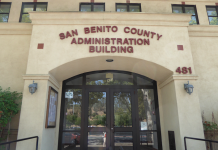
San Benito County Supervisors at a recent meeting approved a conditional use permit for the Betabel commercial project, after hearing two appeals against the proposal due to its likely impacts on the environment and tribal lands.
The Board of Supervisors voted 4-1 Nov. 8 to support the massive project, which proposes a total of 108,425 square feet of commercial space—including a gas station with a convenience store, restaurant, up to five “amusement buildings,” a visitor center, three-story motel (with 116 rooms and an outdoor movie screen), outdoor event area, livestock corral, farmstand and related parking, restrooms, driveways and other supporting facilities, according to the plans filed with the county.
The proposal also includes nature trails and a raptor rehab center.
The board vote also certified an Environmental Impact Report on the project, even though the study identified “significant and unavoidable impacts” from the project on scenic resources, farmland, tribal cultural resources and increased vehicle traffic, according to county staff.
Supervisor Kollin Kosmicki voted against a permit for the project and certification of the EIR.
The owner and developer of the 26-acre project, located at 9644 Betabel Road, is the McDowell Charity Trust. Developer Rider McDowell has promised that all profits from the development of the project will go toward pediatric cancer research.
The county’s consideration of the Betabel project has become increasingly contentious since it was proposed several years ago. Shortly after the county planning commission approved the use permit and EIR on Oct. 12, two appeals were submitted—one from the Amah Mutsun Tribal Band and one from Protect San Benito.
The supervisors heard those appeals at the Nov. 8 meeting, ultimately upholding the planning commission’s decision.
The tribal band’s appeal states that the commission “acted unlawfully in certifying the Final EIR under” state environmental protection laws. The EIR “failed to adequately identify, analyze and mitigate significant impacts on the environment,” claims the Amah Mutsun’s appeal.
Valentin Lopez, of the Amah Mutsun Tribal Band, expanded on the criticism of the Betabel project at the Nov. 8 meeting. The Betabel property sits within the Amah Mutsun’s Tribe’s sacred ancestral home, known as Juristac.
The tribe has steadfastly opposed the commercial development proposal at the site. Lopez on Nov. 8 noted that the history of Native American people in the area now known as San Benito County is one of persecution and death, including more than 19,000 Native Americans killed by missionaries in San Juan Bautista.
“And you want to perpetuate that erasure of native people, and glorify that mission period with this (Betabel) establishment here,” Lopez said.
Sara Clark, attorney for the Amah Mutsun Tribe, added that approval of the Betabel permit and EIR “would perpetuate the subjugation and genocide that has marked the relationship between tribes and colonial governments.”
The Betabel project site also sits on a highway “node,” an area that county planning documents have tabbed for future commercial growth to take advantage of heavy traffic on Highway 101.
Some project opponents have argued the proposal goes against the wishes of the county’s voters, citing the rejection of ballot Measure K in the 2018 election that would have allowed owners to seek a new, less restrictive yet still commercial zoning for the highway node properties.
Some members of the public also questioned the supervisors’ motives in scheduling the vote on a major property development on Election Day, when the county’s voters were deciding on Measure Q. If approved by a majority of voters, the ballot measure would have removed commercial highway node designations from the county’s general plan.
Andy Hsia-Coron, of Protect San Benito, expressed these sentiments in his comments to the board Nov. 8. Protect San Benito’s filed appeal form also argued that the EIR fell short of its analysis, evaluation and disclosure requirements.
“We’re quite unhappy we’re here today at all, as the people of our county are currently considering how major development goes on in this county,” Hsia- Coron said, referring to Measure Q. “This, today, is an effort to essentially rush through a decision before the people have a right to make their decision on this.”
Measure Q is headed for failure in the Nov. 8 election, with more than 56% of the voters so far casting “No” votes.
The majority of the board’s five supervisors disagreed with the appellants, and were satisfied with county staff’s explanations that the Betabel EIR process followed normal procedures and timelines. They also argued the project will ultimately be a benefit to San Benito County, bringing in new public revenues by capitalizing on existing freeway traffic, and cleaning up a property that was once an illegal dump site before McDowell purchased the land.
Kosmicki wanted the board to consider alternatives to the McDowell Trust’s Betabel proposal, which were also analyzed in the EIR. The alternatives were smaller in scale and thus less of a disruption on the surrounding environment, but the rest of the board was not convinced to deviate from the original project.








